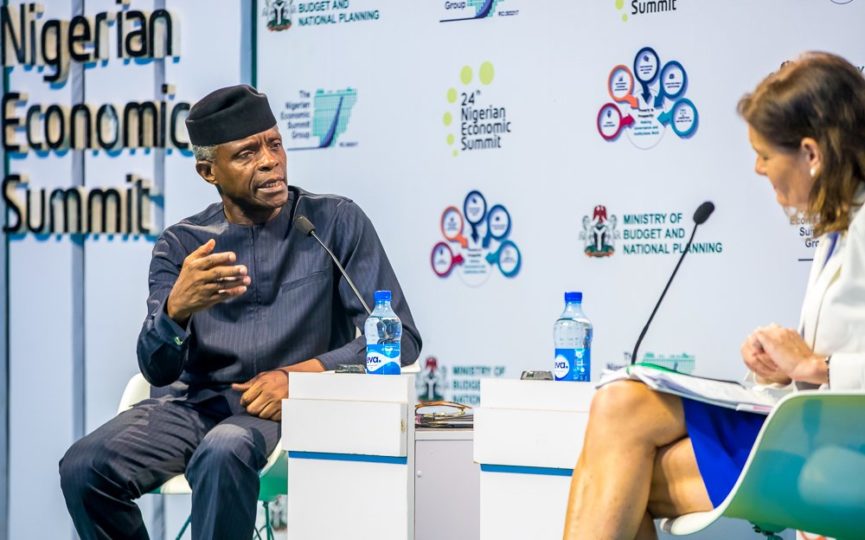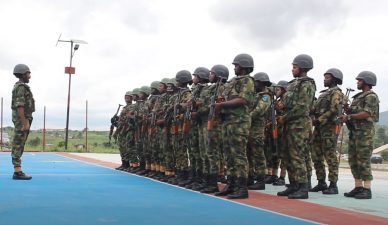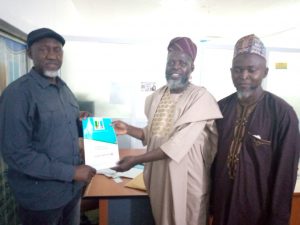Nigeria’s Vice President, Prof Yemi Osinbajo, has said that whenever he wants to sack a public official who has been found to be corrupt, he gets many calls from religious and political leaders in the country not to do so.
Speaking at 24th Nigerian Economic Summit plenary on corruption and rule of law, in Abuja on Monday, Osinbajo stated that the Nigerian elites often times get in the way of ridding the public service of corrupt executives.
Ngaire Woods, the founding dean of Blavatnik School of Government at Oxford University, who moderated the plenary had asked Osinbajo to tell the summit who calls him when he wants to sack someone corrupt.
In his response, Osinbajo stated: “I would like to refer to the Nigerian elite, and it’s probably not fair to be that broad, but practically, every segment, because people who have access to you, they could be political leaders, religious leaders, business leaders, whoever has access to you.
“We have a system where people just feel like, ‘why don’t you just give this guy a break?’ Which again is part of the problem. You don’t get one call, you get several calls”.
Osinbajo said the government is doing so much to tackle grand corruption and systemic corruption.
He stated that since he became vice-president, he has seen how much impact corruption can have on a country, adding that it’s more than he ever imagined.
Meanwhile the Vice President at same event tackled the Organisation for Economic Co-operation and Development, OECD, countries for not doing enough to fast-track return of looted funds.
He charged the nations who are recipients of corruption proceeds to simplify the process of return of such funds to the countries of origin.
His words, “It is very obvious that the systems in many of these countries, simply, are not in any hurry to return the money.
“Of course what the people will say is that there is a judicial system in those countries, anyway.
“It is also obvious that in the same system, when monies related to terrorism or drugs were found, they were very quickly confiscated.
“As a matter fact, in the ‘90s when drug money was all over the place, we signed all manners of mutual legal assistance treaties, conventions of every kind and immediately after 9/11, terrorism financing and all of that was under close scrutiny.
“As a matter of fact, it is, in my view, only by virtue of the fact that terrorism financing came into focus that the proceeds of corruption also came into focus”.
Continuing, he said: “ No one was prepared in the mid ‘90s, especially the OECD countries, none of them was prepared, at that time, to consider the proceeds of corruption as dirty money, which ought to be confiscated and returned to the country from where they came.
“There was a great deal of reluctance. And so we have to go through the legal system, go through the courts, engage the governments and all of that. No one is in a hurry to return the looted funds.
“Recipient nations should see stolen funds for what they are. First of all, that it is a crime. Once you are able to prove, prima facie, that these are stolen funds, they should be repatriated to the countries from where they were stolen.
“There shouldn’t be any complicated process. I think often, we are caught up in arguments that are clearly not necessary, in this process.”
The Vice President, further criticized the banking regulatory institutions of countries where proceeds of corruption were received, for doing nothing against such banks.
“The second thing is to hold the banks to account. Many of the banks are regulated by various institutions in their countries. But many of these institutions don’t say a word, against the banks that receive stolen funds or proceeds of corruption. I think there should be sanctions against such banks by the institutions that regulate them,” he insisted.
Osinbajo stated that the paradox of economic growth and increase in poverty at the same time which had been the story of the nation for a long time was due to what he described as “grand corruption”, in which political leaders simply appropriated public funds for themselves.
According to him, the present administration had stopped such impunity and would continue the fight against corruption, no matter how difficult. He added that the population growth rate above the economic growth rate was also a major factor that had increased the level and number of people below the poverty line in the country.




